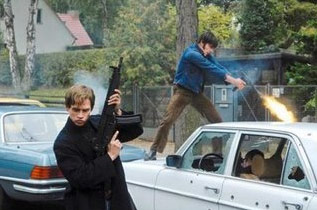
| HOME |
| NERVE |
| REVIEWS |
| ARCHIVE |
| EVENTS |
| LINKS |
| ABOUT US |
| CONTRIBUTORS |
| BACK ISSUES |
| CONTACT US |
 The
Baader Meinhof Complex (18)
The
Baader Meinhof Complex (18)
Directed by Uli Edel
Written by Stefan Aust (book) and Bernd Eichinger (screenplay)
On general release from 28th November 2008
Reviewed by Adam Ford
The Red Army Faction (renamed the 'Baader-Meinhof gang' by press keen to downplay any political significance) were a West German guerilla group who launched a failed insurrection campaign during the 1970s. Their aim was to jolt the urban working class into revolutionary action by attacking what they called 'paper tigers' - symbols of capitalist rule.
Uli Edel and Bernd Eichinger (Downfall)'s account of the RAF's history is nothing if not detailed. Every major event in their formation, rise and fall is documented, from journalist Ulrike Meinhof (Martina Gedeck)'s anger at police attacks on 1967 demonstration, through various bombings and assassinations, to the suicides of the 'first generation' in Stammheim prison ten years later. A strong cast - particularly Moritz Bleibtreu as Andreas Baader and Johanna Wokalek as Gudrun Ensslin - play their parts in excellent reconstructions. However, through the hail of bullets and flying glass, a viewer would be forgiven for asking one unanswered question: why?
Almost all of the young people who would become the Red Army Faction were from relatively well-off backgrounds, and attended university. The events of the late sixties - which saw protest movements worldwide against the war in Vietnam, as well as many different university, street and workplace-based struggles, radicalised them at a time when West German radicals found themselves very isolated. The development of traditional socialist ideas - based on the primary role of the working class in revolutionary struggle - was being blocked by disillusionment with 'actually existing socialism' throughout Eastern Europe. The future RAF fighters saw the West German state - which had former Nazis in prominent positions - becoming more repressive, and helping the new dominant power, the United States, extend its empire around the world. Influenced by the ideas of former Marxists such as Herbert Marcuse, they saw the western working class as being integrated into the capitalist system. The only way they could stir workers - or so it seemed - was by bringing the war home, and adapting the tactics of peasant and desert fighters to an urban setting.
Of course, these individualistic acts of terror did not create a spontaneous outburst of solidarity and class-based struggle. Though the RAF gained a fanatical following amongst some people of their social background, many others were understandably disgusted by workers such as librarians being killed in the name of socialism. In an important sense, the RAF terror campaign was not so much an expression of solidarity, but an expression of hopelessness in solidarity.
These issues are too big for the team behind The Baader Meinhof Complex, so we are left with nothing more than terror porn, albeit extremely well made terror porn.